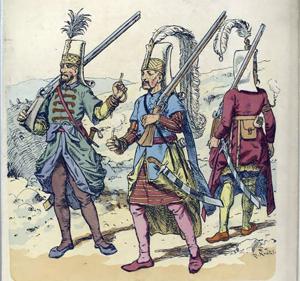
The Janissaries, an elite military corps of the Ottoman Empire, have a complex and often misunderstood history regarding their conversion to Islam. Originally composed of Christian boys taken from their families through the devşirme system, the Janissaries were raised as Muslims and trained as soldiers.
This examination seeks to explore the historical context of their conversion, the motivations behind it, and whether coercion played a significant role in this process.
Historical Context: The Formation of the Janissary Corps
The Janissary corps was established in the late 14th century by Sultan Murad I as a response to the need for a loyal and disciplined military force. The devşirme system involved the periodic conscription of young Christian boys, primarily from the Balkans, who were taken from their families and converted to Islam.
This practice was not merely about recruitment; it was also a means of ensuring loyalty to the Sultan and the state.
The Process of Conversion
- Early Life and Indoctrination: Upon being taken from their families, these boys were placed in Muslim households where they learned Turkish language and culture, as well as Islamic teachings. This process began at a young age, typically between the ages of 10 and 20, making it difficult for them to retain any strong allegiance to their original faith.
- Religious Education: The boys were educated in Islamic principles and practices under the guidance of imams. They were taught to embrace Islam fully, which included undergoing circumcision and participating in religious rituals. This indoctrination aimed to create a sense of belonging within the Muslim community.
- Military Training: After their conversion and education, they entered rigorous military training. The Janissaries became known for their discipline and loyalty, serving as elite infantry troops in various military campaigns throughout the Ottoman Empire.
- Were Africans Forced to Convert to Islam? A Historical Examination
- Were Turks Forced to Convert to Islam? A Historical Examination
Reasons for Conversion
- Loyalty to the Sultan: The conversion process was designed not only to instill Islamic beliefs but also to foster loyalty among the Janissaries towards the Sultan. By raising them as Muslims, the Ottoman Empire ensured that they would be committed to defending the state against both external enemies and internal dissent.
- Social Mobility: For many of these boys, conversion provided opportunities for social advancement that would not have been available within their original Christian communities. Successful Janissaries could rise through the ranks and attain significant power within the empire.
- Cultural Integration: The blending of cultures also played a role in conversion. As they interacted with Muslim communities and engaged in Islamic practices, many Janissaries developed a new identity that incorporated both their past and their new faith.
Conflicting Narratives: Coercion vs. Voluntary Conversion
The narrative surrounding Janissary conversion is not straightforward; it varies significantly across different historical contexts:
- Coercion: While many historians agree that there was an element of coercion involved in the devşirme system—given that boys were taken from their families against their will—once they were integrated into Muslim society, many adapted willingly to their new faith. The initial act of conscription can be viewed as coercive; however, subsequent acceptance of Islam often resulted from socialization rather than force.
- Voluntary Acceptance: Some scholars argue that once integrated into Muslim life, many Janissaries embraced Islam voluntarily due to social pressures and economic incentives associated with being part of the elite military class. As they grew older, they often identified more with their roles as soldiers than with their origins as Christian subjects.
- Were Persians Forced to Convert to Islam? A Historical Examination
- Were Albanians Forced to Convert to Islam? A Historical Examination
The Role of Religion in Janissary Identity
As Janissaries rose through the ranks, they became an integral part of Ottoman society, often embodying Islamic values while retaining elements of their former identities:
- Religious Practices: Janissaries participated in Islamic rituals and upheld Islamic law within their ranks. Their commitment to Islam became a defining characteristic of their identity as soldiers.
- Cultural Influence: The Bektashi Order, a Sufi sect, played a significant role in shaping Janissary culture by providing spiritual guidance and fostering camaraderie among members. This connection helped solidify their identity as Muslims while allowing for some retention of pre-Islamic customs.
Conclusion
In conclusion, while there were elements of coercion involved in the initial conscription of Christian boys into the Janissary corps through the devşirme system, the overall process of conversion to Islam was largely characterized by socialization and voluntary acceptance over time. The transformation from Christian youth to elite Muslim soldiers reflects a complex interplay between forced recruitment and cultural integration.
Understanding this historical context is crucial for appreciating the legacy of the Janissaries within Ottoman history and their role in shaping modern perceptions of military service and religious identity in Turkey today.
As we reflect on this multifaceted history, it becomes clear that the story of the Janissaries is one marked by both coercion and adaptation—a testament to the complexities inherent in cultural exchange throughout history.







